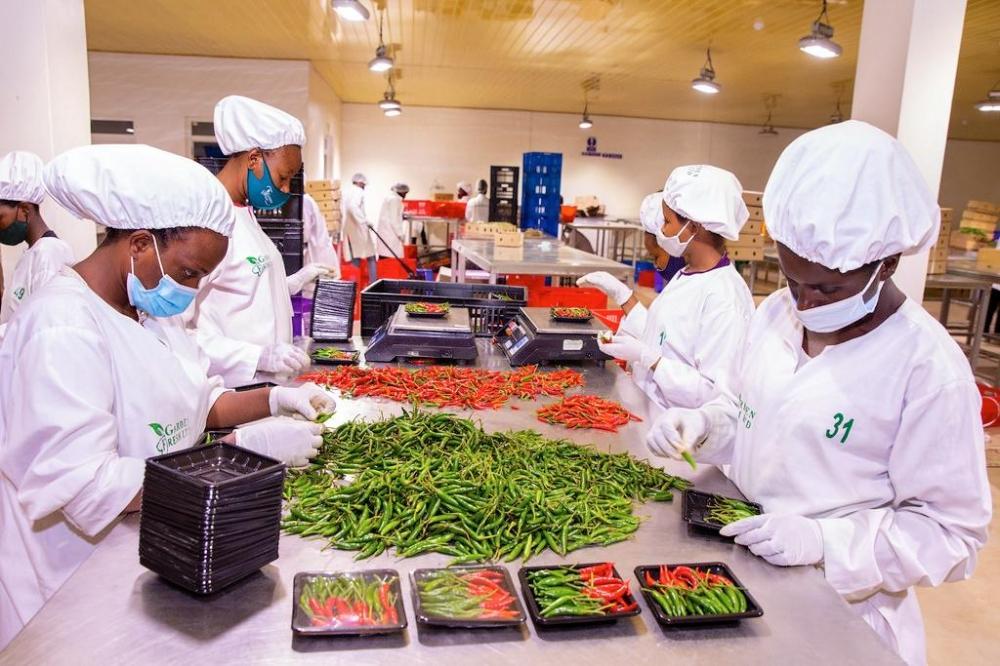Africa-Press – Rwanda. The government is focusing on doing agriculture as a business and large-scale production among drivers to increase its annual agricultural export revenues, Mark Cyubahiro Bagabe, the Minister of Agriculture and Animal Resources, has said.
Bagabe was speaking on August 14, in Kigali, at a meeting aimed at strengthening Rwanda’s agricultural export sector.
The event brought together key stakeholders, including senior government officials, exporters and representatives from financial institutions, to address critical challenges and explore strategies to unlock the full potential of Rwanda’s agri-export sector.
Under Rwanda’s Fifth Strategic Plan for Agriculture Transformation (PSTA 5), the country aims to increase agricultural export revenues from $839.2 million in 2023/2024 to over $1.5 billion (over Rwf2 trillion) by 2028/2029, representing a 78.7 per cent increase.
Achieving this will require investments of Rwf144 billion, accounting for 2.3 per cent of the total PSTA 5 implementation cost.
Overall, while the agriculture sector offers significant opportunities for economic transformation, rural development, and poverty reduction, it still faces several structural and systemic challenges, including limited access to finance, inadequate infrastructure, market volatility, climate-related risks, and gaps in value addition, among others.
Addressing challenges
Bagabe said that the government plans to address challenges that undermine the sector potential, including logistics and infrastructure for perishables – horticulture produce including fruits and vegetables.
Developing cold chain logistics, increasing cargo capacity through the acquisition of dedicated large aircraft by RwandAir, and road infrastructure are among the targeted interventions, he indicated.
Bagabe said that integrating cold chain systems in 10,000- hectare Gabiro Agribusiness Phase II to be developed, which is an irrigation-led large-scale farming project in Eastern Province, is among priorities.
Regarding compliance and market standards, he said that exporters must meet regulatory standards to avoid product rejections, pointing out that the government is working with regulators to support field inspections, registration, and quality monitoring.
Bagabe underscored the need to align the agriculture sector with policy frameworks, and financing mechanisms that allow the country to increase and sustain agri-export areas, and risk management tools to reduce vulnerabilities and unlock investment.
Productivity and economies of scale
Bagabe said that to transform agriculture into a business-oriented sector, Rwanda is focusing on productivity through “food basket sites.”
“We have identified what we call food basket sites. These are aggregated spaces of land which total to around 485,000 hectares,” he said, adding that these are areas “where we can be able to create economies of scale.”
“To us, it’s a game changer. By changing the way we use inputs, and by changing the way we provide advisory in those particular areas,” he said, stating that key performance will be monitored to ensure productivity is achieved.
Sakina Usengimana, the managing Director of Afri Foods Ltd, a company that exports horticulture produce including avocado, chili, and passion fruit, called for tailored financing for smallholder farmers linked to exporters.
She underscored the need for sustainable production to meet export demand.
Robert Rukundo, Chairman of the Horticulture Exporters Association of Rwanda, urged consistency in productivity, volume, and quality, saying these are essential for penetrating premium export markets.
Key export focus areas
As per PSTA 5, chili export revenues are expected to rise eight-fold from $6 million to $48 million annually by 2029.
Bagabe said that the chili revenues are expected to be driven by high demand from Asian markets, particularly China and India.
Coffee export revenues are projected to grow from $78.7 million to $115.5 million annually by 2029, representing 46.8 per cent increase.
Key strategies for growth include replacing aging trees and expanding production areas.
Despite growth in specialty products such as fully washed coffee (which represented 76 per cent of coffee exports as of 2023/24), value addition remains limited. Roasted coffee makes up less than 1 per cent of exports, and only 25 per cent of tea is sold through direct channels.
To address this issue, the country seeks to scale up value addition to its coffee for higher export revenues.
Tea export revenues are projected to grow from $107.7 million to $164.4 million annually by 2029 (52.6 per cent increase). Plans include expansion into high-altitude zones and climate-smart practices will be emphasised – to address flood effects on plantations.
For More News And Analysis About Rwanda Follow Africa-Press






